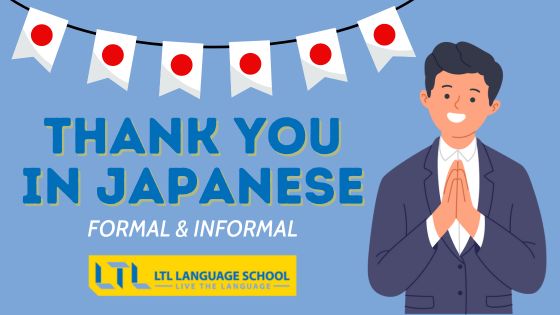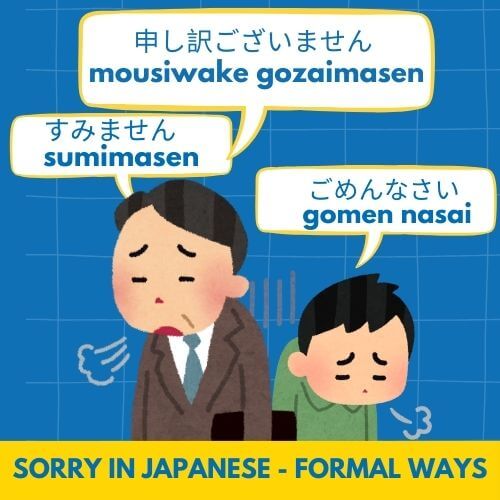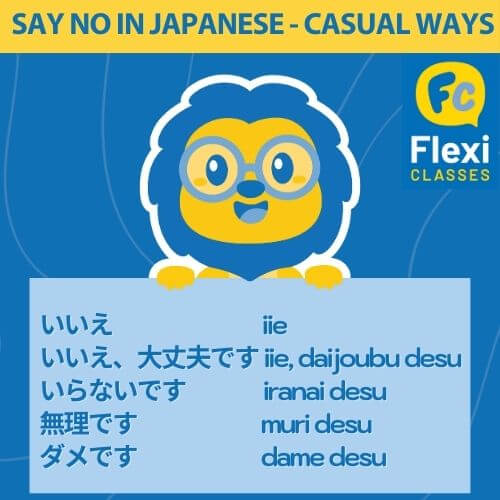Are the Japanese Always Apologetic? How to Say Sorry in Japanese
Understanding the Variations of Sorry in Japanese || Casual and Formal Expressions
As you might’ve guessed, today’s blog post is all about how to say “Sorry” in Japanese.

Apology and humility play an important role in Japanese culture.
In the Japanese spirit of harmony, excessive assertiveness and disagreement are frowned upon, but it is also important to apologize properly if you have disturbed the harmony.
So, with that in mind, it’s very important to learn how to apologize in Japanese.
It’s also crucial that you know how to apologize in more and less formal ways to suit whichever unfortunate situation you’ve found yourself in!
So, keep reading to find out how to express a formal and informal apology and to find out exactly why Japanese people often overuse ‘sorry’ in English!
Sorry in Japanese || Why do Japanese People Say Sorry So Much?
Sorry in Japanese || Formal Expressions
Sorry in Japanese || Casual Expressions
Sorry in Japanese || Very Colloquial Expressions and Slangs
Sorry in Japanese || FAQs
Sorry in Japanese || Why Do Japanese People Say Sorry So Much?
Some people have the impression that Japanese people are always apologetic.
This can come from depictions of Japanese people in movies and other content. Or if you have actually interacted with Japanese people, you may have noticed that Japanese people often say ‘sorry’ immediately.

Why does this happen? One reason for this is that the Japanese are taught English in a verbatim manner when they learn it. As I have mentioned in other articles, there are so many versatile expressions in Japanese for greeting and expressing agreement.
For example, when speaking to someone, you would say “Excuse me.” For English speakers, “Excuse me” in English is translated into “すみません sumimasen” in Japanese.
On the other hand, すみません sumimasen, which is used in the sense of apology, is taught in school as “I’m sorry.” The Japanese think that すみません sumimasen is “I’m sorry” in English, so many Japanese say “sorry” instead of “excuse me” when talking to others, trying to say すみません sumimasen in English.
The Japanese are not apologizing from the beginning of the conversation; they are simply trying to start a conversation. But this gives English speakers the impression that Japanese people are always apologetic.
In fact, although Japan has a culture of humility and self-deprecation is considered a virtue, it does not mean that starting a conversation with an apology is a routine practice among Japanese people.
How common is apologizing in your country or culture? Let us know in the comments section!

How to Say Thank You in Japanese: From Anime Slang to Formal Expressions
Understanding the Variations of How to Say Thank You in Japanese The Japanese language offers multiple ways to say “thank you,” each with its own nuance. The most common and polite expressions are: ありがとうございいます (arigatou gozaimasu) and ありがとうございました …
Sorry in Japanese || Formal Expressions
Let’s start with formal expressions.
Learn expressions used when talking to strangers while traveling or in business situations.
In situations where an apology is being made, the use of polite expressions should be prioritized to convey sincerity, without being too casual.
In such cases, the expressions listed below can be used to avoid rudeness.
すみません sumimasen
ごめんなさい gomen nasai
申し訳ございません moushiwake gozaimasen
失礼しました shitsurei shimashita
As mentioned above, すみません sumimasen can be used as “sorry” to show your apology.
But すみません sumimasen can be used in many situations, like speaking to strangers or sales clerks, or starting a conversation with someone. You can also say すいません suimasen, but すみません sumimasen is the official way.
As expressions that can be used for strangers or people with whom you are not very familiar, you can say ごめんなさい gomen nasai, 申し訳ございません moushiwake gozaimasen” or 失礼しました shitsurei shimashita.
But ごめんなさい gomen nasai may give a slightly childish impression.
As an expression of adulthood, you are supposed to say “すみません sumimasen” or “申し訳ございません mousiwake gozaimasen,” which literally means inexcusable.
Combining the two, saying “すみません、申し訳ございません sumimasen, moushiwake gozaimasen” is the most standard way of apologizing in Japanese.

失礼しました Shitsurei shimashita is also a very useful expression in Japanese. This can be used in many situations like apologizing, farewell, and so on. “すみません、失礼しました Sumimasen, shitsurei shimasita” is also very polite way of saying sorry in Japanese.
You can also say 失礼しました shitsurei shimasita when you leave, especially when you visited someone. This expression is preferred to さようなら sayounara, when you part from your boss, for example. In fact, the Japanese don’t often say さようなら sayounara today.
When you use these expressions, it is also important to bow your head as you say them.
Rather than looking others in the eye and saying clearly, bow your head and say it in an apologetic tone. This is important especially when apologizing.
Sorry in Japanese || Casual Expressions
If you have a very close Japanese friend, always apologizing in a formal way can come off as distant. Below you will learn some expressions for apologizing lightly in casual conversation.
ごめん Gomen
悪い Warui
すまん Suman
許して Yurushite
ごめん Gomen is an abbreviation for ごめんなさい gomen nasai. It is the easiest and most commonly used expression in conversation with friends. You can also say ごめんね gomenne, adding a particle “ね ne”, which is used for reminding.

御免/ごめん Gomen means to exempt. The expression literally means “exempt me from my responsibilities.”
In this regard, there is a word 斬り捨て御免 kirisute gomen. 斬り捨て Kirisute means to kill someone with a sword.
During the feudal era in Japan, Samurais were allowed to strike and kill a lower class who injured their honor. They were not charged with a crime, so this was called 切り捨て御免 kirisute gomen.
I’m afraid that this is a perilous example, but thus you can see that ごめん gomen has been used from the era of samurais.
🥷 Psst… want to learn more about the world of samurai? Check out our Guide to Samurai and Ninjas here!
悪い Warui means bad and the intent of this expression is to say “I feel bad for that.”
For example, you are late for the appointment for 5 mins, and say to your friend “悪い、ごめん warui, gomen.” If you are late for more than an hour, it would be better to say “ごめんなさい gomen nasai.”
すまん Suman is an abbreviation for すみません sumimasen. It’s a very casual and light expression, and it is not a good idea to say this to a senior.
For example, how close you are, you don’t say すまん suman to your parents. On the other hand, it is frequently used for people who are close to each other.
許して Yurushite can be translated into “forgive me.” In Japanese, this sounds very casual. Therefore, it is best to avoid saying this when a mistake is being pointed out to you by your boss or others.

15 Japanese Tongue Twisters with Romaji and Audio 🗣️
Want to improve your Japanese pronounciation and have fun doing it? Check out these 15 Japanese tongue twisters with accompanying videos.
Sorry in Japanese || Very Colloquial Expressions and Slangs
Last but not least,let’s take a look at some slang.
👉 These expressions should not be used in official situations, nor should they be used even with close friends. However, they may appear in anime, so it is beneficial to know them to enjoy anime more.
スマソ sumaso
サーセン saasen
スマソ Sumaso is an Internet slang for すみません sumimasen or すまん suman.
In katakana form, the letter “ン n” looks “ソ so,” so スマン Suman’s n is replaced with ソ so, スマソ sumaso is sometimes used to say すまん/スマン suman, written in katakana form. Since it is a textual play, this is used only in text.

サーセン Saasen is a slang term for すみません sumimasen.
In Japan, this expression is often associated with part-time workers in convenience stores.
It is a term used by employees who are not very motivated and have little loyalty.
When a hero of anime is saying this without any motivation, he is often not apologetic, but is merely saying it as a response.
It is also used on the Internet as a way of saying sorry, even though one has no intention of apologizing. The word is sometimes used in discussions on social networking sites, but this is also likely to be mere mockery, with no apology intended.
That’s all for this article. If you are able to use expressions that are appropriate to the context, your Japanese language skills will be greatly enhanced. Keep up the good work on your studies!
Sorry in Japanese || FAQs:
What is the nicest way to say sorry in Japanese?
In daily conversations, it is nicest to say すみません sumimasen
What is the casual way to say sorry in Japanese?
The casual way to say sorry is ごめん gomen or 悪い warui.
What should I avoid doing when apologizing in Japan?
Avoid making excuses or shifting blame. It is important to take responsibility and show genuine remorse.
Is it important to bow when apologizing in Japan?
Yes, bowing is an important part of showing sincerity and respect when apologizing in Japan.
How do I respond when someone apologizes?
When someone apologizes, you say いいえ、大丈夫です iie daijoubudesu (it’s alright) or お気になさらず okini nasarazu(never mind).
Want More From LTL?
WANT TO LEARN JAPANESE? Check out our online Japanese courses here.
We offer a 7-day free trial to all new students where you can study 24/7.
What about studying Japanese in Japan instead? We’ve got your back. Our Japanese courses in Tokyo can either be taken in small groups of no more than 5 students or individually for a more tailored experience.
We even offer incredible homestay experiences in Tokyo as well.
Come and be a part of this amazing community.









